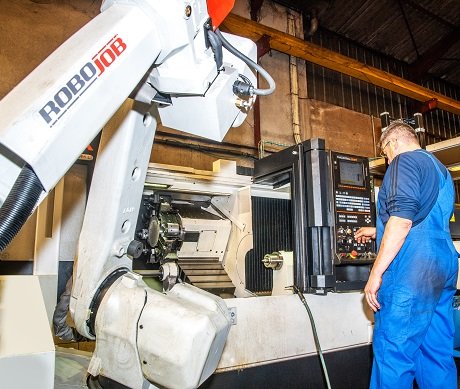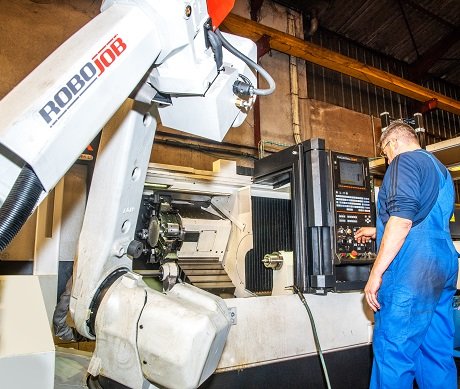
Boton-Merlet
The company's activities have evolved to grow into a combination of a machine manufacturer and supplier.
Boton-Merlet
Boton-Merlet was founded in Moncoutant, in the West of France not long after the Second World War. Over the years, the company's activities have evolved to grow into a combination of a machine manufacturer and supplier.
Today, Boton-Merlet manufactures industrial mixers that are used in agriculture. In addition, it offers its services as a supplier in a wide range of mechanical activities: mechanized welding, 3D design, cutting, machining, bending, welding and assembly.
Automation has been well established within Boton-Merlet for several years, but in 2019 the first robot was purchased for the machining department. And for a very special reason.
Patrice Labaeye, Owner: “It’s actually very simple. Owing to the many assignments that we have to carry out, we were forced to increase our capacity on our turning machine. The problem was that we simply didn’t have the physical space to install a second machine. The solution was therefore obvious: by automating the machine, we would theoretically be able to increase the capacity to 24 hours a day. We were more than satisfied with that, and we didn’t have to buy a second machine at all.
Of course I’m telling you this now briefly and concisely, but the whole story took a bit longer. Two or three years ago I started to think about this, and through Mazak I came into contact with RoboJob. They told me: "If you want a robot that really works, then you just have to buy a RoboJob." I also noticed that RoboJob had already automated a lot of Mazak machines, both existing machines and new machines. The Mazak we have here was already 3 years old, but that turned out to be no problem at all.
We opted for a Turn-Assist 200i with a 20 kg robot. This is a highly compact automation unit, which for us, is also simply necessary. In April 2019, we automated our Mazak QT SMART 200ML/1000 using this. The installation was completed in a week, with one day of training also being provided. Our operators of course know automation from our other departments, but for them it was completely new. However, they got used to it very quickly. Since then they’re also able to get help from RoboJob’s Service department and that's quite a help. One day’s training is sufficient in itself in order to get started, but if it’s necessary, one can still get help from RoboJob.
Now that we’ve been using the Turn-Assist for more than half a year, we’re seeing that the continuity and reliability of such an automation system are particularly important. It’s not so much the speed of the robot that’s important, but that it remains just as stable and reliable every hour of the day. And with RoboJob, that’s absolutely the case!
By coincidence, the operator of this Mazak turning machine left the company in June. We decided not to replace him, and yet we’re succeeding in running the machine for more hours per day than with the operator. A colleague now sets up the machine and ensures that the robot can run. We run the larger batches at night and it’s then that the robot continues to operate for 10 hours straight. That's much more important than the speed of the robot. But of course we use the robot as much as possible, both during the day and at night. I dare to state that we have more than succeeded in our intention: the capacity of our turning machine has increased considerably, and our costs have fallen. That's a clear story, right?”
